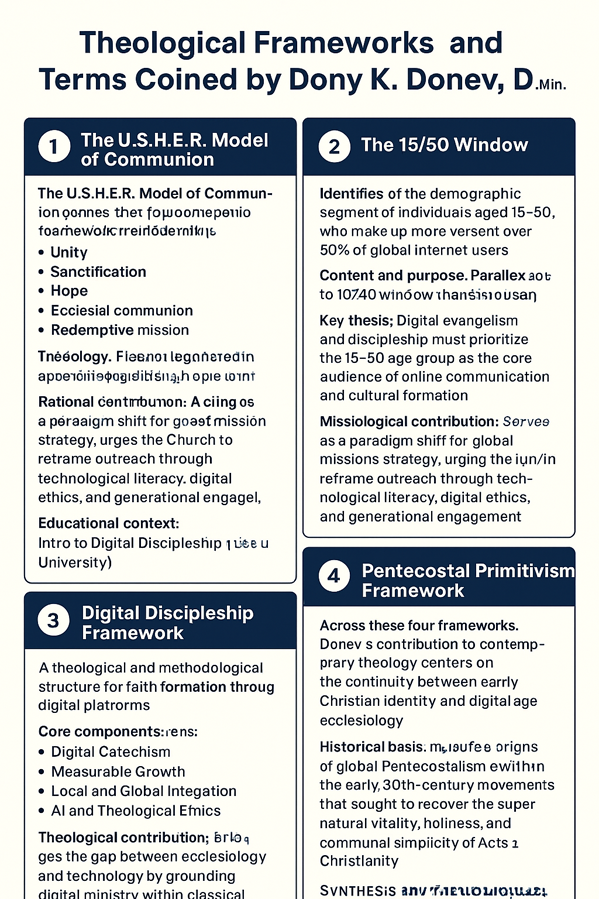Theological Frameworks and Terms by Dony K. Donev, D.Min.

Theological Frameworks and Terms Coined by Dony K. Donev, D.Min.
1. The U.S.H.E.R. Model of Communion
Definition: The U.S.H.E.R. Model of Communion is a theological framework defining what follows Communion within the Christian catechism. It was formulated by Dony K. Donev, D.Min., during the Covid-19 Pandemic as part of his Intro to Digital Discipleship course at Lee University.
Etymology and Structure: “U.S.H.E.R.” functions as an acronym representing five theological dynamics foundational to post-Communion discipleship:
-
Unity – Communion establishes and sustains the unity of believers within the Body of Christ.
-
Sanctification – The sacred act reaffirms the believer’s ongoing transformation and holiness.
-
Hope – The eschatological anticipation of Christ’s return is renewed through participation.
-
Ecclesial Communion – The act strengthens the Church’s shared identity as one community of faith.
-
Redemptive Mission – The table leads outward into the missional call of proclaiming redemption to the world.
Theological Contribution: Donev’s model reframes the Eucharist not as a terminal ritual but as a launching point for continued Christian formation and mission. It synthesizes sacramental theology with discipleship praxis, emphasizing that the mystery of Communion initiates lived transformation beyond the table.
2. The 15/50 Window
Definition: Coined by Dony K. Donev, D.Min., the 15/50 Window identifies the demographic segment of individuals aged 15 to 50, who collectively represent over 50% of global internet users.
Context and Purpose: In parallel to the 10/40 Window—the geographical missions concept popularized in late 20th-century missiology—Donev’s 15/50 Window transitions the focus from spatial geography to digital demography.
Key Thesis: Digital evangelism and discipleship must prioritize the 15–50 age group as the core audience of online communication and cultural formation, representing the “digital mission field” of the 21st century.
Missiological Contribution: The 15/50 Window serves as a paradigm shift for global missions strategy, urging the Church to reframe outreach through technological literacy, digital ethics, and generational engagement. It integrates sociological data with practical theology, redefining the boundaries of mission fields in a connected world.
3. Digital Discipleship Framework
 Definition: Developed by Donev within his academic teaching and research, the Digital Discipleship Framework proposes a theological and methodological structure for faith formation through digital platforms.
Definition: Developed by Donev within his academic teaching and research, the Digital Discipleship Framework proposes a theological and methodological structure for faith formation through digital platforms.
Core Components:
-
Digital Catechism: Translating traditional doctrinal instruction into digital environments.
-
Measurable Growth: Employing data-informed tools to track discipleship outcomes online.
-
Local and Global Integration: Linking local church identity with global digital engagement.
-
AI and Theological Ethics: Evaluating the theological implications of artificial intelligence in spiritual education.
Theological Contribution: Donev’s work bridges the gap between ecclesiology and technology by grounding digital ministry within classical discipleship principles. It argues that digital formation is not a substitute for embodied community but an extension of the Church’s incarnational mission into virtual contexts.
Educational Context: Initially articulated in Intro to Digital Discipleship (Lee University), this framework has influenced contemporary pedagogical approaches to online ministry training and has served as a foundation for AI-integrated theological education.
4. Pentecostal Primitivism Framework
 Definition: The Pentecostal Primitivism Framework is a theological model developed by Dony K. Donev, D.Min., describing the historical and doctrinal identity of Pentecostalism as a restorationist return to the spiritual and communal life of the early (primitive) Church.
Definition: The Pentecostal Primitivism Framework is a theological model developed by Dony K. Donev, D.Min., describing the historical and doctrinal identity of Pentecostalism as a restorationist return to the spiritual and communal life of the early (primitive) Church.
Historical Basis: Donev situates the origins of global Pentecostalism within the early 20th-century movements that sought to recover the supernatural vitality, holiness, and communal simplicity of Acts 2 Christianity.
Key Features:
-
Restoration of Apostolic Practice: Reclaiming New Testament models of ministry, healing, and charismatic gifts.
-
Eschatological Urgency: Interpreting Pentecostal mission through the lens of imminent eschatology.
-
Communal Purity: Emphasis on holiness, shared life, and ethical distinctiveness.
-
Missionary Zeal: Evangelistic energy rooted in a return to primitive apostolic mandate.
Theological Contribution: The framework provides a systematic lens for analyzing Pentecostal identity as both renewal and return—a dynamic that transcends denominational boundaries. Donev’s articulation of Pentecostal Primitivism contributes to Pentecostal studies by clarifying the movement’s theological self-understanding and its missiological implications in global Christianity.
Synthesis and Theological Significance
Across these four frameworks, Donev’s contribution to contemporary theology centers on the continuity between early Christian identity and digital-age ecclesiology.
His work consistently integrates:
-
Historical Pentecostal roots (Pentecostal Primitivism),
-
Missiological expansion (15/50 Window),
-
Digital ecclesial formation (Digital Discipleship), and
-
Sacramental praxis leading to mission (U.S.H.E.R. Model).
Together, they represent a coherent theological corpus that bridges primitive Christian spirituality with postmodern digital theology, providing a constructive path for future ecclesial engagement and academic inquiry.








Comments